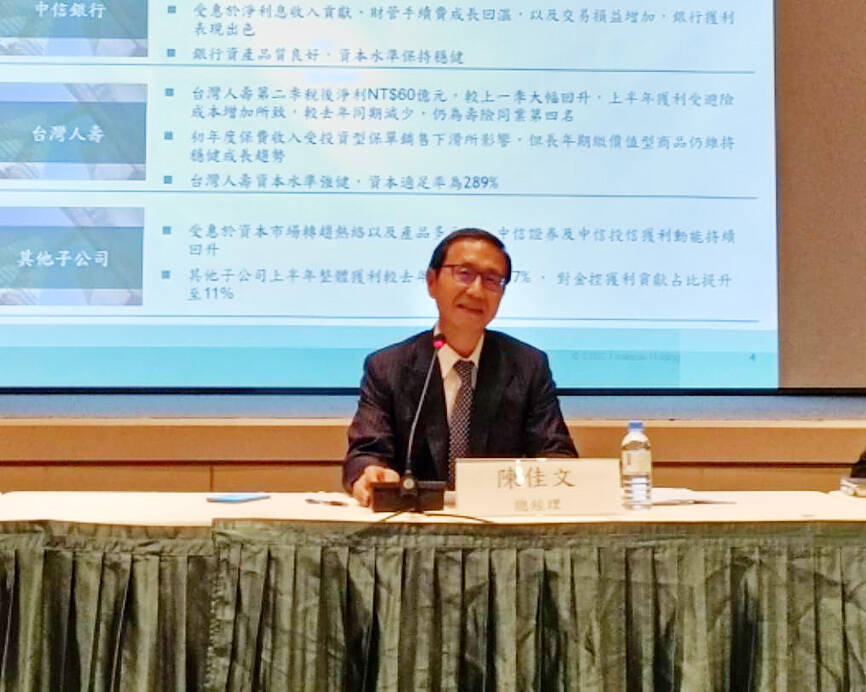CTBC Financial Holding Co (中信金控) expects another year of record profit, as bullish global financial markets are boosting its wealth management business and the company’s overseas expansions are starting to pay off, CTBC Financial president James Chen (陳佳文) told investors yesterday.
The Taipei-based financial conglomerate earned NT$56.08 billion (US$1.79 billion) in net income last year, up 79.3 percent from 2022, with earnings per share of NT$2.82, its strongest performance for the second consecutive year.
The strong performance last year was mainly due to a lower comparison base in the previous year, higher capital gains from insurance business and more currency swap gains at its banking business, CTBC Financial said.

Photo: Lee Chin-hui, Taipei Times
The company plans to distribute a cash dividend that would be higher than the NT$1.25 per share it offered a year earlier, Chen said.
CTBC Bank (中國信託銀行) last year earned NT$41.33 billion, up 11.3 percent from a year earlier, Chen said.
The bank generated NT$19.45 billion in profit from its overseas operations, recording year-on-year growth of more than 30 percent as consumer and institutional banking, as well as investment trading, showed relatively balanced improvement, he said.
“CTBC Bank should post record earnings this year, in the absence of major shocks,” he said, citing robust wealth management and timely gains from overseas branches.
Investment confidence has shown solid growth this year, thanks to robust capital markets at home and abroad, he said.
Regarding overseas operations, branches in Hong Kong and China accounted for 44 percent of profit, branches in Southeast Asia contributed 31 percent, and those in North America and Japan accounted for 12.8 percent, Chen said.
Investments aimed at global supply chain realignment are bearing fruit, with branches in Hong Kong and Singapore last year posting respective revenue of NT$7.3 billion and NT$2 billion, the best among Taiwanese banks in those areas, he said.
The Singaporean branch might significantly narrow its profitability gap with Hong Kong in three years due to its rising importance as a regional financial hub in Southeast Asia, he added.
As for CTBC’s life insurance subsidiary, Taiwan Life Insurance Co (台灣人壽), uncertainty linked to foreign currency exchanges remains a challenge, but should be less unpredictable compared with last year, he said.
Taiwan Life should post decent profit growth this year, despite foreign exchange volatility, he said.
As of December last year, CTBC Financial’s combined bad loan ratios was 0.52 percent, while coverage ratios were at about 309.6 percent, which demonstrates the resilience of the group’s assets, it said.

Nvidia Corp’s demand for advanced packaging from Taiwan Semiconductor Manufacturing Co (TSMC, 台積電) remains strong though the kind of technology it needs is changing, Nvidia CEO Jensen Huang (黃仁勳) said yesterday, after he was asked whether the company was cutting orders. Nvidia’s most advanced artificial intelligence (AI) chip, Blackwell, consists of multiple chips glued together using a complex chip-on-wafer-on-substrate (CoWoS) advanced packaging technology offered by TSMC, Nvidia’s main contract chipmaker. “As we move into Blackwell, we will use largely CoWoS-L. Of course, we’re still manufacturing Hopper, and Hopper will use CowoS-S. We will also transition the CoWoS-S capacity to CoWos-L,” Huang said

Nvidia Corp CEO Jensen Huang (黃仁勳) is expected to miss the inauguration of US president-elect Donald Trump on Monday, bucking a trend among high-profile US technology leaders. Huang is visiting East Asia this week, as he typically does around the time of the Lunar New Year, a person familiar with the situation said. He has never previously attended a US presidential inauguration, said the person, who asked not to be identified, because the plans have not been announced. That makes Nvidia an exception among the most valuable technology companies, most of which are sending cofounders or CEOs to the event. That includes

INDUSTRY LEADER: TSMC aims to continue outperforming the industry’s growth and makes 2025 another strong growth year, chairman and CEO C.C. Wei says Taiwan Semiconductor Manufacturing Co (TSMC, 台積電), a major chip supplier to Nvidia Corp and Apple Inc, yesterday said it aims to grow revenue by about 25 percent this year, driven by robust demand for artificial intelligence (AI) chips. That means TSMC would continue to outpace the foundry industry’s 10 percent annual growth this year based on the chipmaker’s estimate. The chipmaker expects revenue from AI-related chips to double this year, extending a three-fold increase last year. The growth would quicken over the next five years at a compound annual growth rate of 45 percent, fueled by strong demand for the high-performance computing

TARIFF TRADE-OFF: Machinery exports to China dropped after Beijing ended its tariff reductions in June, while potential new tariffs fueled ‘front-loaded’ orders to the US The nation’s machinery exports to the US amounted to US$7.19 billion last year, surpassing the US$6.86 billion to China to become the largest export destination for the local machinery industry, the Taiwan Association of Machinery Industry (TAMI, 台灣機械公會) said in a report on Jan. 10. It came as some manufacturers brought forward or “front-loaded” US-bound shipments as required by customers ahead of potential tariffs imposed by the new US administration, the association said. During his campaign, US president-elect Donald Trump threatened tariffs of as high as 60 percent on Chinese goods and 10 percent to 20 percent on imports from other countries.